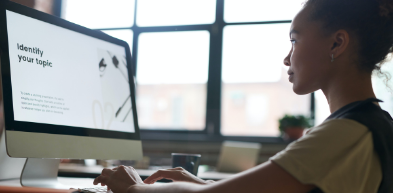
Communication Tips - To Support Children and Young People's Raised Anxiety
As the debate about schools re-opening rages on and parents start preparing for an unprecedented September, many families will yet again experience raising tensions and anxiety levels. Some might find it difficult to adequately support their children’s mental health when they are experiencing anxiety themselves.
During this unparalleled time, it has been difficult to interpret all of the information being given about the pandemic. Parents, in particular, have needed to manage their own emotional needs and quickly learn how to support their children and young people (CYP) to understand and make sense of the current situation. Helping CYPs cope and deal with increased anxiety around uncertainties and disruptions to normal life has become the main focus for families and schools.
So, what is anxiety?
Mind charity explains:
“Anxiety is what we feel when we are worried, tense or afraid – particularly about things that are about to happen, or which we think could happen in the future. Anxiety is a natural human response when we perceive that we are under threat. It can be experienced through our thoughts, feelings and physical sensations.” https://www.mind.org.uk/information-support/types-of-mental-health-problems/anxiety-and-panic-attacks/about-anxiety/
CYPs may exhibit some of the following signs of anxiety/ stress, for example:
– Repetitive questions, or other behaviours that happen over and over
– Being silent or mute
– Insisting on routines and preventing changes
– Taking a prolonged time to settle to sleep
– Bedwetting, soiling, bloating, constipation
– Withdrawing, refusing to join in
– Screaming, shouting and behaviour outbursts
– Developing new or excessive phobias
– Flight, fight or freeze response
– Stomach aches, butterflies
– Headaches, migraines
– Self-injurious behaviour such as nail biting, pulling hair out, biting, head banging, teeth grinding, digging at skin etc.
– Physically or verbally challenging to others
– Change in appetite
– Lack of self-care or obsessive hygiene rituals/routines
– Rapid breathing
General tips for supporting children and young people’s communication in times of anxiety
A natural reaction to anxiety is that it can impair our understanding of language (listening skills) and our use of verbal communication (speech), the ability to hear high pitched sounds also reduces. Keeping these physical reactions in mind when talking to a highly anxious person is important and you may find the following suggestions supportive:
– Try to minimise spoken language, using key words to get the message across for example ‘computer off – dinnertime’ rather than ‘come on dinner’s ready turn your computer off before your food gets cold.’
– Visuals (written words, hand drawn pictures, objects, photos, gesture) to support your language
– Allow extra time to decode (time to think about what’s been said, process the information & respond. “Pause after asking a question for at least 10 seconds (and longer if a child or young person is using a communication aid) to give them enough time to answer”
https://www.thecommunicationtrust.org.uk/media/449470/involving_cyp_with_slcn_toolkit.pdf
– Model expectations with minimal language and carry out the action you want them to do e.g. hang your coat up, shoes off, wait so people can pass, walk one behind the other, deep breathing etc.
– Support choices using visuals and reduce the amount on offer to support a successful response
Useful Websites and resources:
– Anxiety – A 1 minute guide for parents and carer’s of children and young people with Autism https://childrenandfamilyhealthdevon.nhs.uk/wp-content/uploads/2020/04/1-minute-guide-anxiety.pdf
– A 1 minute guide for parents and carer’s of children and young people with communication difficulties https://childrenandfamilyhealthdevon.nhs.uk/wp-content/uploads/2020/04/1-minute-guide-communication.pdf
– Activities to develop Speaking and Listening Skills https://ican.org.uk/a-message-to-our-supporters-on-coronavirus/activities-to-develop-speaking-and-listening-skills/
– Simple, fun and practical ideas for families to support their child’s speech, language and communication development (from newborn – 5 years of age) https://hungrylittleminds.campaign.gov.uk/
– Helping children aged 2-4 to learn from home during Coronavirus https://www.gov.uk/guidance/help-children-aged-2-to-4-to-learn-at-home-during-coronavirus-covid-19
– Widget are offering free unrestricted access to Widget Online for 30 days, to make sure that symbol users have access to the systems and resources they need https://mailchi.mp/widgit/wo
– Advice and activities to support Children’s speech language and communication skills https://speechandlanguage.info/parents
– Building children’s communication through imitation and play http://www.hanen.org/Helpful-Info/Autism-Corner.aspx
Talking about COVID-19 with a child or young person
Having conversations about worrying subjects such as Coronavirus can be a difficult and anxiety provoking in itself. Some tips to help support you are listed below: 1. Plan ahead & be prepared– as much as you can be 2. Be as calm as possible 3. Keep to the facts 4. Minimise time spent watching, reading about Covid19 related information 5. Be willing to openly & visibly use your own calming strategies when needed e.g. practising breathing techniques/exercise.
Useful Websites and Resources:
– Supporting Neurodiverse Children In Challenging Times Such As During Self-Isolation https://www.youtube.com/watch?v=dXPtqmHKNoE&feature=youtu.be
– Downloadable free resources and e-books to support people through the Coronavirus Pandemic – https://booksbeyondwords.co.uk/coping-with-coronavirus
– This is a simple social story with symbols to help explain the current situation, why we are not at school and what we can do to stay safe https://www.hacw.nhs.uk/sltcovid19
– Having a conversation with children about Coronavirus https://ican.org.uk/a-message-to-our-supporters-on-coronavirus/how-to-talk-to-children-about-coronavirus/?utm_source=ICC+March+2020&utm_campaign=b2f76d15fa-I+CAN+Communicate+-+March+2020&utm_medium=email&utm_term=0_3c0e36dac3-b2f76d15fa-116393953
– Speech and Language Therapist Alex Kelly (Speaking Space) explains (with Makaton) what coronavirus is, and what the current advice is around it. A good resource for children with and without speech, language and communication needs, and people with autism or learning difficulties https://www.youtube.com/watch?v=xq8ZBn-7oKo&feature=youtu.be
– A short story about ‘Dave the Dog’ for young children to help explain Coronavirus without causing fear https://nursedottybooks.files.wordpress.com/2020/03/dave-the-dog-coronavirus-1-1.pdf
– Aimed at older children, a social story about Pandemics and Covid 19 by Carol Gray https://carolgraysocialstories.com/wp-content/uploads/2020/03/Pandemics-and-the-Coronavirus.pdf
– Coronavirus social story https://childrenandfamilyhealthdevon.nhs.uk/wp-content/uploads/2020/04/coronavirus-social-story.pdf
– Coronavirus widget symbols https://childrenandfamilyhealthdevon.nhs.uk/wp-content/uploads/2020/04/coronavirus-widgit-symbols.pdf
– Real life experiences that individuals with autism and their families are experiencing during the coronavirus from the National Autistic Society https://www.autism.org.uk/services/helplines/coronavirus/resources/stories-from-the-spectrum.aspx
– Looking after children and young people during the coronavirus outbreak from ‘Every mind matters’ https://www.nhs.uk/oneyou/every-mind-matters/looking-after-children-and-young-people-during-coronavirus-covid-19-outbreak/
– The Community is the ‘National Autistic Societys’ discussion forum for autistic people, their families and other wider network. It allows you to meet online and share your thoughts and experiences https://community.autism.org.uk/?Redirected=true
– https://happylearners.info/social-stories/coronavirus.html
– Makaton Social Story Symbols to develop children’s understanding of the Covid 19 https://www.makaton.org/shop/shopping/freeDownloadDetails/Covid-social-story
– Makaton symbols providing information about the Coronavirus https://www.makaton.org/shop/shopping/freeDownloadDetails/Coronavirus-information
– A social story booklet written for children who use Alternative Augmentative Communication (AAC) https://cdn.shopify.com/s/files/1/0770/8269/files/Social_Story_TTMT_covid-19.pdf?v=1584473666
– A fact sheet about Coronavirus for children by the NHS https://www.youtube.com/watch?v=iMR3WPCRuAI&feature=emb_title
– Free printable resources for Coronavirus support https://www.elsa-support.co.uk/category/free-resources/coronavirus-support/
Website links to support wellbeing during Covid-19
– https://www.mind.org.uk/information-support/coronavirus/coronavirus-and-your-wellbeing/
– https://youngminds.org.uk/blog/what-to-do-if-you-re-anxious-about-coronavirus/?gclid=EAIaIQobChMIsN_ZoY786AIVFeDtCh0_LAmgEAAYBCAAEgJvGfD_BwE
– https://www.nhs.uk/oneyou/every-mind-matters/coronavirus-covid-19-anxiety-tips/?WT.tsrc=Search&WT.mc_id=Corona&gclid=EAIaIQobChMIsN_ZoY786AIVFeDtCh0_LAmgEAAYASAAEgLbmfD_BwE
– Looking after your mental health during self-isolation https://youngminds.org.uk/blog/looking-after-your-mental-health-while-self-isolating/
– Headspace meditations https://www.headspace.com/covid-19
– Looking after ourselves through meditation https://www.calm.com/blog/take-a-deep-breath
– Twinkl well-being hub https://www.twinkl.co.uk/wellbeing
Apps to support anxiety, mental health and well-being
– Create your own personal mix of relaxing sounds exactly how you want it with calming visuals. https://sleeporbit.app/
– Sesame Street “Breathe, think, do” App to support calming breathing techniques
– https://mindbe-education.com/top-20-mindfulness-apps-kids/
– https://www.commonsensemedia.org/app-reviews/calm
– https://www.commonsensemedia.org/app-reviews/stop-breathe-think
– https://www.commonsensemedia.org/app-reviews/hummly-healing-with-music
– https://itunes.apple.com/gb/app/brain-in-hand-mobile/id607805378?mt=8
– http://www.zonesofregulation.com/index.html
– Indoor ball games https://frugalfun4boys.com/indoor-ball-games-kids/?fbclid=IwAR1RJruyuGeRd-C9ZLAOEbhJZ8rUxetoZSzAsEtsnI2SN9TTCIWFRtKdZW4
– P.E with Joe Wicks https://www.youtube.com/watch?v=QGYXh_G8X6A
– P.E and activity ideas https://imoves.com/imovement-signup
– Information on daily exercise https://autismeye.com/coronavirus-outdoor-exercise/?fbclid=IwAR21st0ISeHfVX1zm-UtONtuTO9uqwDYV7Y1QuY8vG22BLpG02qaiEeyeD4#more
– Yoga videos https://awakeandmindful.com/best-kids-yoga-videos-on-youtube/
– Cosmic kids yoga with stories https://www.youtube.com/watch?v=xlg052EKMtk&feature=emb_rel_pause
– Yoga for kids https://www.youtube.com/watch?v=X655B4ISakg&feature=emb_logo
Other useful links
– Snippets are a weekly round-up of information relating to Children with Additional Needs, produced by Signpost Plus
– South area: https://childrenandfamilyhealthdevon.nhs.uk/wp-content/uploads/2020/04/southern-snippets-16th-april-2020.pdf
– North Area: https://childrenandfamilyhealthdevon.nhs.uk/wp-content/uploads/2020/04/northern-snippets-16th-april-2020.pdf
– Support for Schools, Parents and Pupils – Babcock LDP
https://www.babcockldp.co.uk/campaigns/coronavirus-support-for-schools-parents-and-pupils
Resources and books
– Flow chart of options for difficult situations- see documents
– Calming box with items in that support relaxation, favourite scents, twiddle items, pictures, music, glitter bottle, favourite scents & fabrics etc.
– Calm jars – https://lemonlimeadventures.com/lego-calm-down-jar/
– Red Beast (Controlling Anger) – Kay Al-Ghani
– My Hidden Chimp – Professor Steve Peters
– Panicosaurus (Anxiety) – K I AL-Ghani
– The Disappointment Dragon – K I AL-Ghani
– The Incredible Five Point Scale – Kari Dunn Buron and Mitzi Curtis
– The New Social Story Book – Carol Gray
– When My Worries Get Too Big- A Relaxation Book For Children Who live With Anxiety – Kari Dunn Buron


